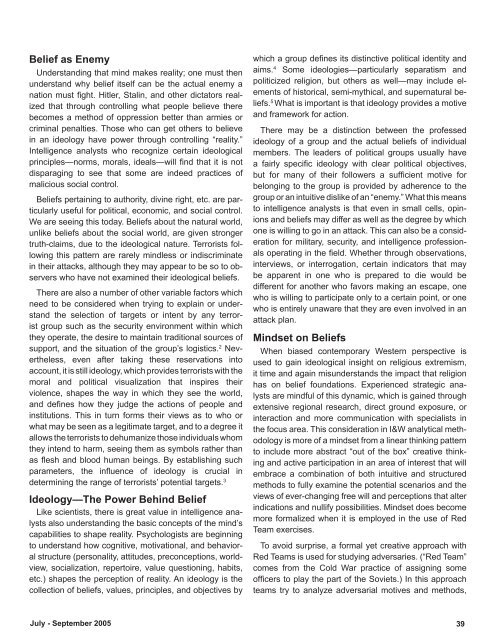Military Intelligence Professional Bulletin - Federation of American ...
Military Intelligence Professional Bulletin - Federation of American ...
Military Intelligence Professional Bulletin - Federation of American ...
You also want an ePaper? Increase the reach of your titles
YUMPU automatically turns print PDFs into web optimized ePapers that Google loves.
Belief as Enemy<br />
Understanding that mind makes reality; one must then<br />
understand why belief itself can be the actual enemy a<br />
nation must fight. Hitler, Stalin, and other dictators realized<br />
that through controlling what people believe there<br />
becomes a method <strong>of</strong> oppression better than armies or<br />
criminal penalties. Those who can get others to believe<br />
in an ideology have power through controlling “reality.”<br />
<strong>Intelligence</strong> analysts who recognize certain ideological<br />
principles—norms, morals, ideals—will find that it is not<br />
disparaging to see that some are indeed practices <strong>of</strong><br />
malicious social control.<br />
Beliefs pertaining to authority, divine right, etc. are particularly<br />
useful for political, economic, and social control.<br />
We are seeing this today. Beliefs about the natural world,<br />
unlike beliefs about the social world, are given stronger<br />
truth-claims, due to the ideological nature. Terrorists following<br />
this pattern are rarely mindless or indiscriminate<br />
in their attacks, although they may appear to be so to observers<br />
who have not examined their ideological beliefs.<br />
There are also a number <strong>of</strong> other variable factors which<br />
need to be considered when trying to explain or understand<br />
the selection <strong>of</strong> targets or intent by any terrorist<br />
group such as the security environment within which<br />
they operate, the desire to maintain traditional sources <strong>of</strong><br />
support, and the situation <strong>of</strong> the group’s logistics. 2 Nevertheless,<br />
even after taking these reservations into<br />
account, it is still ideology, which provides terrorists with the<br />
moral and political visualization that inspires their<br />
violence, shapes the way in which they see the world,<br />
and defines how they judge the actions <strong>of</strong> people and<br />
institutions. This in turn forms their views as to who or<br />
what may be seen as a legitimate target, and to a degree it<br />
allows the terrorists to dehumanize those individuals whom<br />
they intend to harm, seeing them as symbols rather than<br />
as flesh and blood human beings. By establishing such<br />
parameters, the influence <strong>of</strong> ideology is crucial in<br />
determining the range <strong>of</strong> terrorists’ potential targets. 3<br />
Ideology—The Power Behind Belief<br />
Like scientists, there is great value in intelligence analysts<br />
also understanding the basic concepts <strong>of</strong> the mind’s<br />
capabilities to shape reality. Psychologists are beginning<br />
to understand how cognitive, motivational, and behavioral<br />
structure (personality, attitudes, preconceptions, worldview,<br />
socialization, repertoire, value questioning, habits,<br />
etc.) shapes the perception <strong>of</strong> reality. An ideology is the<br />
collection <strong>of</strong> beliefs, values, principles, and objectives by<br />
which a group defines its distinctive political identity and<br />
aims. 4 Some ideologies—particularly separatism and<br />
politicized religion, but others as well—may include elements<br />
<strong>of</strong> historical, semi-mythical, and supernatural beliefs.<br />
5 What is important is that ideology provides a motive<br />
and framework for action.<br />
There may be a distinction between the pr<strong>of</strong>essed<br />
ideology <strong>of</strong> a group and the actual beliefs <strong>of</strong> individual<br />
members. The leaders <strong>of</strong> political groups usually have<br />
a fairly specific ideology with clear political objectives,<br />
but for many <strong>of</strong> their followers a sufficient motive for<br />
belonging to the group is provided by adherence to the<br />
group or an intuitive dislike <strong>of</strong> an “enemy.” What this means<br />
to intelligence analysts is that even in small cells, opinions<br />
and beliefs may differ as well as the degree by which<br />
one is willing to go in an attack. This can also be a consideration<br />
for military, security, and intelligence pr<strong>of</strong>essionals<br />
operating in the field. Whether through observations,<br />
interviews, or interrogation, certain indicators that may<br />
be apparent in one who is prepared to die would be<br />
different for another who favors making an escape, one<br />
who is willing to participate only to a certain point, or one<br />
who is entirely unaware that they are even involved in an<br />
attack plan.<br />
Mindset on Beliefs<br />
When biased contemporary Western perspective is<br />
used to gain ideological insight on religious extremism,<br />
it time and again misunderstands the impact that religion<br />
has on belief foundations. Experienced strategic analysts<br />
are mindful <strong>of</strong> this dynamic, which is gained through<br />
extensive regional research, direct ground exposure, or<br />
interaction and more communication with specialists in<br />
the focus area. This consideration in I&W analytical methodology<br />
is more <strong>of</strong> a mindset from a linear thinking pattern<br />
to include more abstract “out <strong>of</strong> the box” creative thinking<br />
and active participation in an area <strong>of</strong> interest that will<br />
embrace a combination <strong>of</strong> both intuitive and structured<br />
methods to fully examine the potential scenarios and the<br />
views <strong>of</strong> ever-changing free will and perceptions that alter<br />
indications and nullify possibilities. Mindset does become<br />
more formalized when it is employed in the use <strong>of</strong> Red<br />
Team exercises.<br />
To avoid surprise, a formal yet creative approach with<br />
Red Teams is used for studying adversaries. (“Red Team”<br />
comes from the Cold War practice <strong>of</strong> assigning some<br />
<strong>of</strong>ficers to play the part <strong>of</strong> the Soviets.) In this approach<br />
teams try to analyze adversarial motives and methods,<br />
July - September 2005 39
















